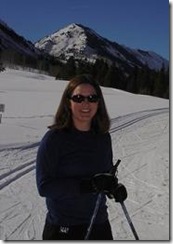Featured Woman in Technology: Dianne Marsh
 Dianne Marsh co-owns a software consulting company called SRT Solutions, with Bill Wagner. They focus on learning and implementing new technologies to help their customers make technology decisions. Dianne actively works with customers as a software consultant. She typically enjoys back-end development and that which is "computationally intensive". One recent project involved the University of Michigan's software which supports their survey system. Dianne's role was not limited to software; she helped them to improve their entire process and workflow.
Dianne Marsh co-owns a software consulting company called SRT Solutions, with Bill Wagner. They focus on learning and implementing new technologies to help their customers make technology decisions. Dianne actively works with customers as a software consultant. She typically enjoys back-end development and that which is "computationally intensive". One recent project involved the University of Michigan's software which supports their survey system. Dianne's role was not limited to software; she helped them to improve their entire process and workflow.
At the end of the day, Dianne is motivated by simplicity. "I'm inspired both by helping our customers to get their jobs done AND by discovering cool and interesting ways to make that happen in the most unobtrusive way possible. The goal is to help someone get their job done; it's really not about the software. The nice thing about software is it simplifies the way people do their work."
Dianne feels that the best part of her job is clearly the people with whom she works. "We've grown from just the two of us to about 17, and I have learned something from each and every one of them." Dianne also thrives on being very engaged with customers and understanding their specific business. "Understanding the application domain is as important as understanding technology. This is an amazing career because you get to learn about both!"
Dianne has a 3 year old and a 5 year old. Like all working mothers, Dianne strives to balance work with family life. "When my daughter asks me why I can't work at her daycare and take care of kids, I tell her that mommies and daddies need to do what they do best. And that, for me, is writing software. I try to always keep that in mind." Dianne also believes strongly in spending free time with her kids and not over-scheduling activities. "My parents didn't allow us to have a lot of after-school or weekend activities. We could take ONE Saturday morning class, and we could participate in ONE evening activity. The rest of the time was reserved for family time. I hope to do the same with my children."
Moving her office outside of her home into a more traditional setting has really helped Dianne with work/life balance as well. "Previously, I never left the office. With wireless internet at home, it's easy to get trapped into a 24/7 work cycle, but that's not good for my family or for me. When I used to work at home, the first response from people was how great it was that I could work at home with my kids around me. No way. I can't get anything done for work with my kids there, and I always had childcare when working at home."
Dianne first tried computer science in college; she enrolled as a Computer Science major without knowing what it was! However, she stuck with it, finding that it was a nice way to draw languages together with math and science. After graduation, she wrote code for several companies in Michigan in areas ranging from analytical instrumentation to automotive applications.
Dianne went back to graduate school in 1990 for a Masters degree. After grad school, she decided that she wanted to work in Ann Arbor and interviewed with a startup company there. This was a big turning point for her; she realized that working for a startup company and starting your own company aren't that different in terms of risk. Although she describes herself as "risk-averse", she could better control the risk if she ran the company. Yet, independent contracting was challenging in a different way. As an independent contractor working on a job, she would get calls for work, but she was already in the middle of a job. Then, when that contract was up, she needed to make a million phone calls looking for work, so it was a lot of stopping and starting. Starting SRT Solutions was a way to manage that timing and not lose as much work. When asked about the risk in owning a company, she warns, "Working for big companies gives you a false sense of job security. Whole divisions can be removed; companies can be relocated. In small companies, you know what's going on and have more input in big decisions. At the very least, you know when you don't have any work to do!"
Dianne emphasizes the importance of managing your own career. "A company's objectives may be different from your own. If you don't keep an eye on that target, you risk letting the company define your career. Pay attention to where you want to be and reevaluate constantly. If you aren't going where you want to, alter your course. Someone could be doing Fortran programming for 10 years, and then her company goes out of business, she pops her head up, and she realizes that she can't find work doing that anymore...that is far more risky than working on your own, where you remain much more in touch with the market."
Dianne's advice to other women in technology: "Gender-specific groups can offer support and encouragement, but for technical expertise, don't shy away from the gender-neutral groups. Actively participate in user group meetings and at conferences. You will meet a lot of really interesting people and you will learn a lot."